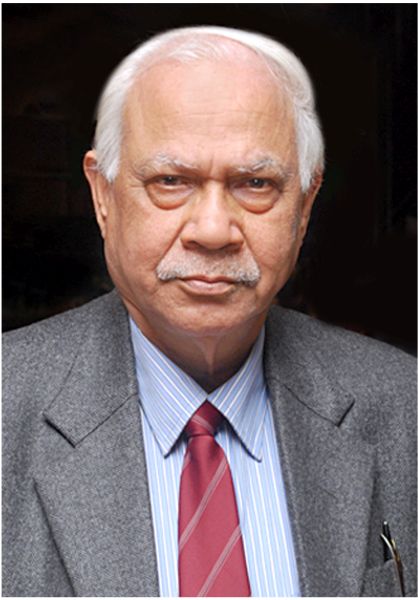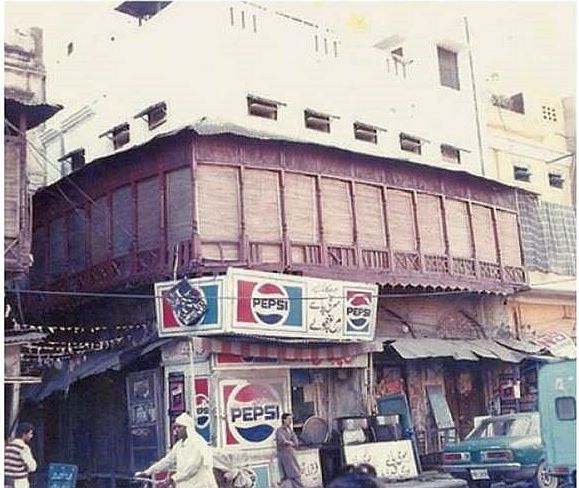Latest Contributions
Lahore in August 1947, as etched on my mind
Category:

Satish Chopra was born 1942 in Lahore, and his family moved to Delhi in 1947. After his M.A. from Delhi University, he became a banker, and retired from the Central Bank of India in 2001. He has a passion for learning, history, literature, and nostalgic film and light classical music. His book Forgotten Masters of Hindi Cinema was well-received in India and Pakistan. In 2016, he got a National Film Award from the President of India. He is now working on his autobiography. His email is satishchopra@rediffmail.com.
The rooftop of our house situated at the right side entrance of Rasala Bazaar, Purani Anarkali, Lahore, was from where I saw fire all around the city in August 1947. The fire, which started from Shah Almi Gate, is one of my earliest memories. The Anarkali police station was situated at about two hundred metres from our house, and from our rooftop we could see its entire courtyard. At times, wailings of the detainees could be heard clearly in our home.

My family home in Lahore. at the right side entrance of Rasala Bazar, Purani Anarkali, Lahore. Picture was obtained in 1989 through a common acquaintance. Its authenticity was confirmed by my father, who expired in 1996.
Seven decades have since passed. My parents, two elder sisters, an elder brother and I had to leave Lahore when brutal killings took place all over the city. Amazingly, the recollections of my home have not faded away, even though at that time I was not even five years old. I was born in October 1942 in Lahore.
On the fateful day of August 14, 1947 our office-cum-domestic help Sita Ram put two steel trunks, a recently purchased Ferrenti radio-receiving-set and a Singer sewing machine in a horse-drawn tonga.
That was all we could carry along with us for our journey across a border that was decided by a former member of the British Bar and chairman of the Boundary Commission, Sir Cyril Radcliffe, and which resulted in the divide and consequent killings, perhaps the biggest holocaust in the history of mankind. (Editor note: The Radcliffe Award was announced on 17 August 1947.)
While leaving, my father handed over two buffaloes and twenty rupees to one of our Muslim tenants (a dhobi) living on the ground floor, for taking care of the cattle. He, like many other Lahoris, had the illusion that they would return to the city soon. The reality was quite different, but we didn`t realise that we were leaving our much loved Lahore forever.
We soon reached a refugee camp set up at the D.A.V. College, Lahore. Next morning, we and our luggage were put in an army truck, to be shifted to class III rail compartment going to the Attari station. The overcrowded train, driven by a steam locomotive, was soon packed beyond its capacity as there were many passengers sitting on the roofs of the coaches. As a result, it took more than eight hours to cover a distance of only 30 kilometres between Lahore and Attari. The starving and thirsty passengers were finally given some food bread, lintels and pickles by volunteers at the Attari station.
It was a horrific sight. My ailing mother fainted but getting a glass of water was impossible. The stink of the dead bodies coming from outside the compartment and the appalling smell inside it made the situation worse. I must admit that even after all these years I have not forgotten the sight and the stink. The scenes and the smells are still fresh in my memory. And yet despite my best efforts I cannot adequately describe the images etched on my psyche. The train then moved forward for a while before stopping abruptly. To everyone`s amazement all the passengers were asked to vacate the train. There was commotion and chaos everywhere, with some people crying and others just sobbing. Nobody knew what to do.
Able-bodied people along with their bags, trunks, children and elderly family members were shouting and running, all at the same time.
A few hours later a sizeable crowd was pushed into army trucks for their onward journey to some refugee camps in Amritsar.
The vacant train coaches were soon occupied by Muslims coming from East Punjab for their journey to Lahore.
On our way to Amritsar, we saw dreadful scenes on both sides of the road. Convoys of people were moving in both directions, on foot, bullock carts, lorries and other vehicles. The old and the infirm were being carried by younger and healthier men on their backs.
Because of the chaos around us, our trucks were virtually crawling. Consequently, it took almost six hours for us to reach Amritsar. The passengers were offloaded at various schools, which had been converted into refugee camps and were already overcrowded. After staying at the camp for a day, our family somehow moved to a distant relative`s house, where we stayed for about ten days.
Now let me share with you a gem from my childhood memories of Amritsar. From a window of the house where we were staying I saw a narrow-gauge circular train that was used to dispose of garbage and human waste of the entire city, as Amritsar didn`t have a sewage system in those days.
Because my father was a share broker in Lahore and there was no stock exchange in Amritsar, he decided to move to Delhi. So we boarded a train going to Delhi. The ghastly journey of about 450km to Delhi took more than 48 hours.
The coaches were driven by a steam locomotive which seemed to be suffering from asthma or some chest disorder as its speed never exceeded 20km per hour.
After stopping at various places for short periods of time, the train pulled up at the station in Ambala, which was full of flies and mosquitoes. A dreadful stench was coming from a train standing at the adjacent platform. It was simply awful.
Fellow passengers who got down to fetch water for us told us that all the coaches in the nearby train were full of dead bodies. The train was supposed to carry Muslims from Delhi to Lahore.
After leaving the Ambala station our train, which was carrying ‘living human bodies', took about 18 hours to reach Delhi.
______________________________________
© Satish Chopra 2019
Comments
Add new comment